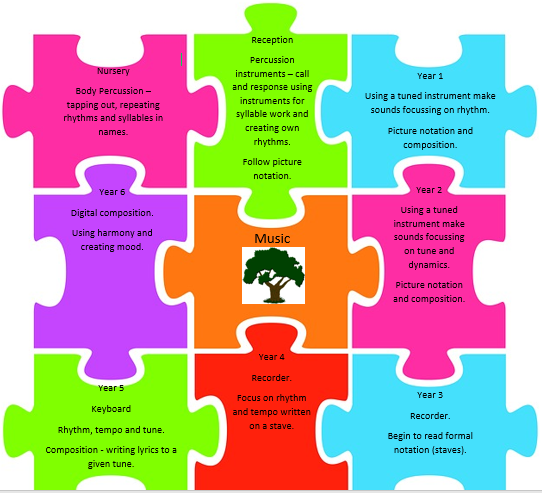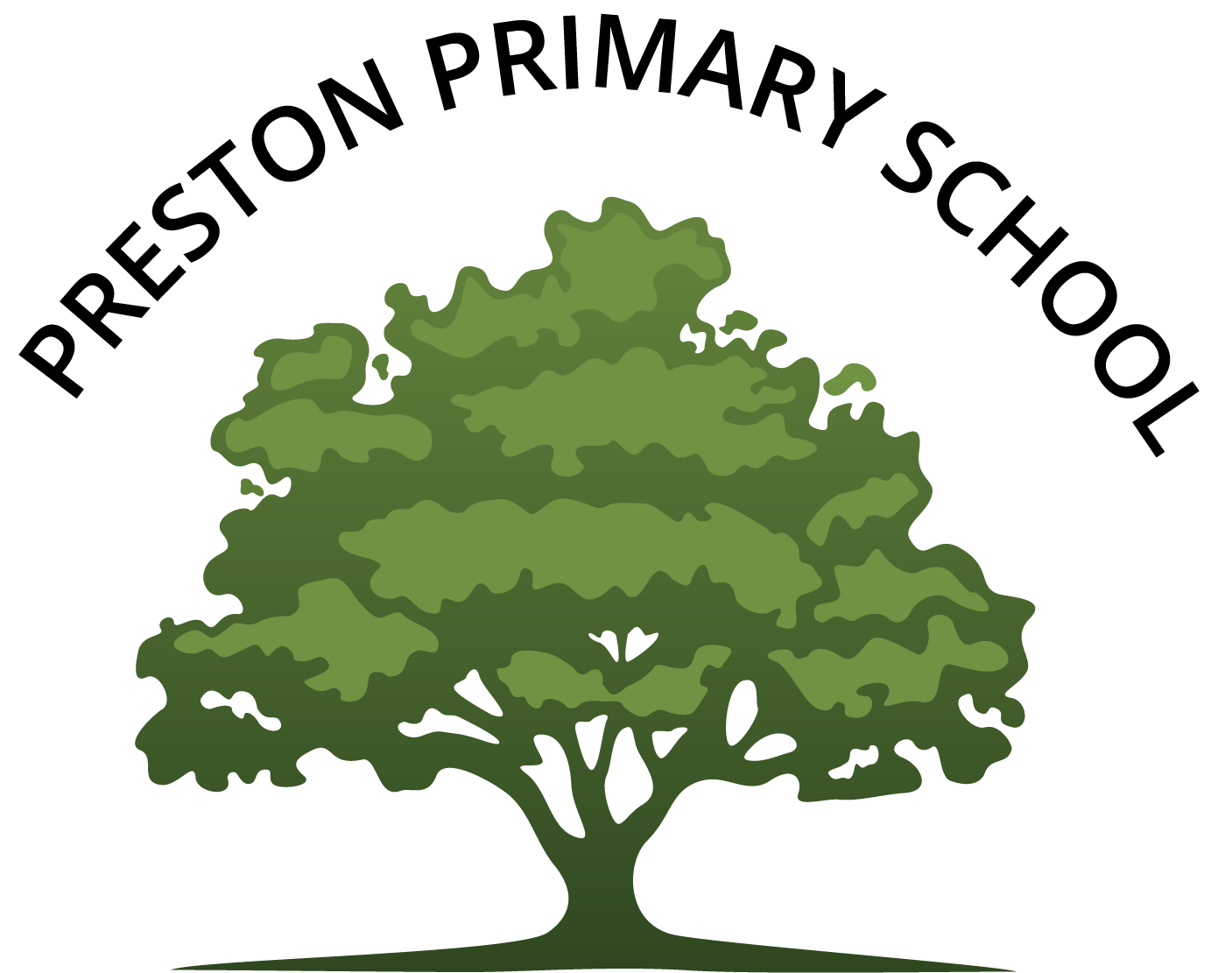Music
Children in Preston Primary will be given opportunities to listen carefully to a variety of music, enabling them to appreciate and evaluate what they hear. This will include a whole school approach to listening through a ‘Track of the Week’ played every day throughout school. They should be able to relate music to other aspects of life and associate music to different emotions, countries, occasions and religions. Children will be able to use music positively through both composition and performance, embed music in their education and express their own ideas and feelings through music.

Long Term Framework
Express Yourself
| In Early Years the children will be encouraged to |
| Explores and learns how sounds can be changed.Explores the different sounds of instruments Children experiment with ways of changing sounds. |
| In Key Stage One this then is built upon through studying |
| Experiment with, create, select and combine sounds using the interrelated dimensions of music. |
| In Key Stage Two this is then built upon through the study of |
| Use and understand staff and other musical notations. Improvise and compose music for a range of purposes using the interrelated dimensions of music. |
Performance
| In Early Years the children will be encouraged to |
| Sings a few familiar songs. Taps out simple repeated rhythms. Begins to build a repertoire of songs and dances. Children sing songs and dance and make music |
| In Key Stage One this then is built upon through studying |
| Use their voices expressively and creatively by singing songs and speaking chants and rhymes. Play tuned and untuned instruments musically. |
| In Key Stage Two this is then built upon through the study of |
| Play and perform in solo and ensemble contexts, using their voices and playing musical instruments with increasing accuracy, fluency, control and expression. |
Listen Up!
| In Early Years the children will be encouraged to |
| Imitates movement in response to music.Enjoys joining in with dancing and ring games.Beginning to move rhythmically. |
| In Key Stage One this then is built upon through studying |
| Listen with concentration and understanding to a range of high-quality live and recorded music. |
| In Key Stage Two this is then built upon through the study of |
| Listen with attention to detail and recall sounds with increasing aural memory. Appreciate and understand a wide range of high-quality live and recorded music drawn from different traditions and from great composers and musicians. Develop an understanding of the history of music. |
Instruments to learn
- Foundation Stage – Percussion
- Key Stage One – Tuned Percussion
- Key Stage Two – Recorder / Keyboards
Music year Group Overview
| Music | |
| Nursery | Imitates movement in response to music Enjoys joining in with dancing and ring games Sings a few familiar songs Explores and learns how sounds can be changed Explores the different sounds of instruments |
| Reception | Beginning to move rhythmically Taps out simple repeated rhythms Begins to build a repertoire of songs and dances. Children experiment with ways of changing sounds Children sing songs and dance and make music |
| Year One | Experiment with, create and select sounds using the interrelated dimensions of music Use their voices expressively and creatively by singing songs and speaking chants and rhymes Play tuned and untuned instruments musically – Glockenspiel Listen with concentration and understanding to a range of high-quality live and recorded music |
| Year Two | Experiment with, create, select and combine sounds using the interrelated dimensions of music Use their voices expressively and creatively by singing songs and speaking chants and rhymes Play tuned and untuned instruments musically – Glockenspiel Listen with concentration and understanding to a range of high-quality live and recorded music |
| Year Three | Play and perform in solo and ensemble contexts, using their voices and playing musical instruments with increasing accuracy, fluency, control and expression Improvise and compose music for a range of purposes using interrelated dimensions of music Listen with attention to detail and recall sounds with increasing aural memory Use and understand staff and other musical notations Appreciate and understand a wide range of high-quality live and recorded music drawn from different traditions and from great composers and musicians Develop an understanding of the history of music. Introduce recorders. In each year group one British Classical composer Edward Elgar (Land of Hope and Glory), one musician and one traditional music genre with be looked at. |
| Year Four | Play and perform in solo ensemble contexts, using their voices and playing musical instruments with increasing accuracy, fluency, control and expression Improvise and combos music for a range of purposes using the interrelated dimensions of music Listen with attention to detail and recall sounds with increasing aural memory Use and understand staff and other musical notations Appreciate and understand a wide range of high quality live and recorded music drawn from different traditions and from great composers and musicians Develop an understanding of the history of music. In each year group one British Classical composer Gustav Holst (The Planets), one musician and one traditional musical genre will be looked at. |
| Year Five | Play and perform in solo and ensemble contexts, using their voices and playing musical instruments with increasing accuracy, fluency, control and expression Improvise and compose music for a range of purposes using the interrelated dimensions of music Listen with attention to details and recall sounds with aural memory Use and understand staff and other musical notations Appreciate and understand a wide range of high-quality live and recorded music drawn from different traditions and from great composers and musicians Develop an understanding of the history of music. Introduce Keyboards In each year group one British Classical composer Hubart Parry (Jerusalem) one musician and one traditional musical genre will be looked at. |
| Year Six | Play and perform in solo and ensemble contexts, using their voices and playing musical instruments with increasing accuracy, fluency, control and expression Improvise and compose music for a range of purposes using the interrelated dimensions of music – selecting instruments from those previously encountered for effect Listen with attention to detail and recall sounds with aural memory Use and understand staff and other musical notations Appreciate and understand a wide range of high-quality live and recorded music drawn from different traditions and from great composers and musicians Develop an understanding of the history of music. In each year group one British Classical composer George Handel (Zadock the Priest), one musician and one traditional musical genre will be looked at. |
Children at Preston Primary School have a weekly Music lesson, taught by either the class teacher or a music specialist who teaches aspects of the curriculum in years 1-6. In addition to this, Key stages 1 and 2 are taught singing weekly with their key stage.
Children are able to showcase their musical talents within school and at local events.
The whole school listens to ‘Music of the Week’ throughout the week at Preston. Tracks are chosen by a different member of staff each week and played across school in classes and in Assemblies. This piece of music is also used in Listening and Appraisal activities. Children enjoy trying to guess which member of staff may have chosen it. The staff member is revealed at the end of the week when they give a reason for their choice.
Extra Curricular opportunities
Children in both Key Stage 1 and 2 at Preston Primary are offered after school clubs throughout the academic year.



